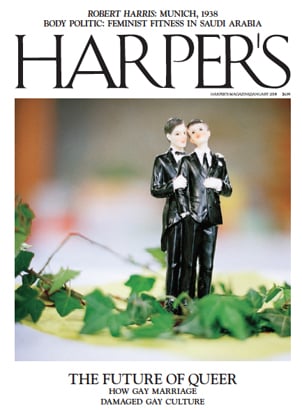Inside the January Issue
Fenton Johnson, Andrew Cockburn, Mansi Choksi, Rebecca Solnit, Yasmine Seale, and more...
 It was on May 6, 2012, that Vice President Joe Biden gave his blessing to gay marriage, incidentally noting that “Will & Grace probably did more to educate the American public than almost anything anybody has done so far.” His stamp of approval was soon followed by Barack Obama’s, and it seemed like decades of activism by gay Americans had finally paid off. In “The Future of Queer,” however, Fenton Johnson begs to disagree. Much of what he values in gay culture comes very specifically from its outsider status: queer men and women, deprived of the conventional infrastructure that straight people take for granted, were forced to make up their own versions of family, friendship, community. In Johnson’s view, heterosexual America could learn an awful lot from these DIY institutions, which value emotional ties over blood relations and felt commitment over the flimsy fact of a marriage certificate. “Let us all be queers,” he writes in the final sentence of his eloquent essay—a plea not for uniformity but for a kind of freewheeling reverence, which recognizes that “we live and die in mystery, that all human endeavor must begin and end in respect, for ourselves, for one another, for our fellow creatures.”
It was on May 6, 2012, that Vice President Joe Biden gave his blessing to gay marriage, incidentally noting that “Will & Grace probably did more to educate the American public than almost anything anybody has done so far.” His stamp of approval was soon followed by Barack Obama’s, and it seemed like decades of activism by gay Americans had finally paid off. In “The Future of Queer,” however, Fenton Johnson begs to disagree. Much of what he values in gay culture comes very specifically from its outsider status: queer men and women, deprived of the conventional infrastructure that straight people take for granted, were forced to make up their own versions of family, friendship, community. In Johnson’s view, heterosexual America could learn an awful lot from these DIY institutions, which value emotional ties over blood relations and felt commitment over the flimsy fact of a marriage certificate. “Let us all be queers,” he writes in the final sentence of his eloquent essay—a plea not for uniformity but for a kind of freewheeling reverence, which recognizes that “we live and die in mystery, that all human endeavor must begin and end in respect, for ourselves, for one another, for our fellow creatures.”
In “Swap Meet,” Andrew Cockburn recounts Wall Street’s crusade against the Volcker Rule, which bars commercial banks from speculating with their own capital. The financial crisis of 2008 was supposed to have led to reform. Instead the toothless provisions of Dodd-Frank have been further defanged by a legion of industry lobbyists, which means that the predatory bankers are up to their old tricks again. Mansi Choksi looks at the perils of conjugal life in “The Newlyweds”—especially for Indian couples with the temerity to marry across caste lines. Her story is both profoundly romantic and disquieting, given the violent punishment meted out to such boundary-busting lovers. And in “Body Politic,” Sarah Aziza reports from Saudi Arabia, where women, long forbidden from assembling, driving, or even laughing in public, have begun to campaign for the right to exercise.
Our publisher, John R. MacArthur, takes a rueful look back at the cultural politics of the Cold War in “The Human Factor.” Rebecca Solnit compares cannibals and capitalists in her Easy Chair column (they turn out to be fellow travelers), and in Readings, we have court testimony by Taylor Swift, a poem by Alli Warren, and Experian’s pungent pigeonholing of American households, from “Golf Carts and Gourmets” to “Generational Soup” to “Red, White, and Bluegrass.” Throw in powerful back-of-the-book pieces by Lidija Haas, Yasmine Seale, and David Denby, as well as historical fiction by Robert Harris, and you’ll find that we’ve rung in the New Year quite effectively here at Harper’s Magazine. Let’s hope that 2018 is an improvement on its despair-inducing predecessor!



